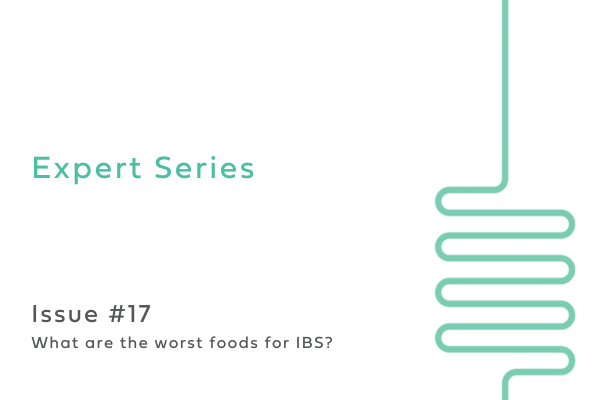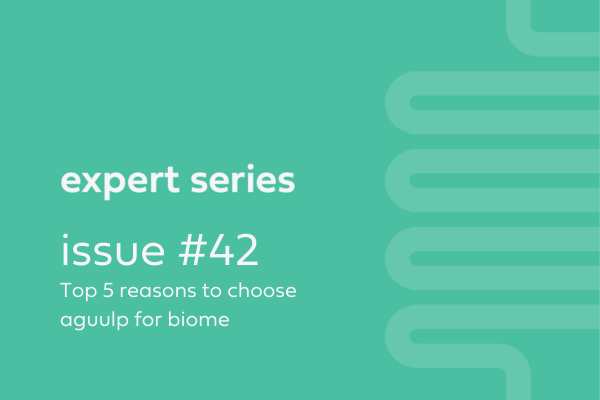What are the worst food for IBS?

We’re back with another round of valuable information to help you and your digestive woes. This week, we’re looking at how diet plays a crucial role in managing Irritable Bowel Syndrome (IBS) symptoms. We’ll also explore the power of aguulp’s liposomal technology and how it can help support your gut health journey.
What Foods to Avoid With IBS – And What To Embrace
We know that food plays a huge role in our gut health, and although there isn’t a specific cure for IBS, knowing what foods to avoid with IBS may help you to manage your symptoms. IBS can manifest itself through various symptoms, including:
- Constipation
- Excessive wind
- Abdominal pain
- Diarrhoea
- Bloating
- Lack of energy
If you’ve been diagnosed with IBS, you may be familiar with the ‘low FODMAP diet’ and you may have been given a leaflet from your doctor with a long list of what foods to avoid with IBS. However, growing evidence has shown that there is no ‘one-size-fits-all’ approach to IBS and the influence of diet is unique to each individual. There is no generalised dietary advice that will work for everyone.
It is also important to note that often people with IBS may report that some foods can be bothersome at certain times but not at other times. There may be a sense of inconsistency and unpredictability, which is why keeping a food diary to track foods, symptoms, and associated factors (such as stressors, lack of sleep and/or medications) can help identify trigger foods.
The foods highlighted below are general dietary recommendations and include foods that may trigger and relieve the more common symptoms of IBS.
What Are The Worst Foods For IBS? The Lowdown
So, what are the worst foods for IBS typically? When it comes to IBS as a whole, some foods are notorious for triggering discomfort. Identifying these culprits is the first step towards a happier gut. Here are the most common food categories to avoid:
High-FODMAP Foods: fermentable oligosaccharides, disaccharides, monosaccharides and polyols (FODMAPs) are short-chain carbohydrates that can trigger IBS symptoms. Foods
Foods containing dairy and gluten: For certain individuals, dairy and/or gluten can be particular trigger foods for IBS symptoms. For example for those who may be intolerant or sensitive to lactose (the sugar found in milk) and for some people dairy can be inflammatory to the gut, leading to exacerbation of symptoms. Certain people find they are sensitive or intolerant to gluten (which is different from coeliac disease where an immune reaction occurs) or can simply find gluten quite irritating to the gut, again leading to exacerbation of symptoms.
Since dairy (milk, cheese, yoghurts etc) and gluten containing products (such as bread and pasta) make up major food groups in the diet, if you are considering eliminating them from the diet, it would be advisable to remove these food groups temporarily initially, to observe if symptoms improve. If you are looking to remove these food groups permanently, ideally this should be done under the supervision of a professionally trained individual or medical professional.
Fried and Greasy Foods: Foods high in unhealthy fats can aggravate IBS symptoms. Steer clear of deep-fried and greasy meals, opting for healthier cooking methods like baking or steaming.
Artificial Sweeteners: Many artificial sweeteners can worsen IBS symptoms. Avoid sugar substitutes like sorbitol and xylitol, which are common in sugar-free gum and processed foods.
What Foods Help with IBS?
Now you know more about what foods to avoid with IBS, what foods help with IBS?
Foods to eat to relieve constipation, excessive wind, and abdominal pain:
Finding relief from constipation, wind, and abdominal pain is essential for those with Irritable Bowel Syndrome. By incorporating certain foods into your diet, you can help to alleviate these symptoms and regain control over your digestive health:
Soluble Fibre: Foods rich in soluble fibre can help soften stools and improve constipation. Some examples include:
- Oats
- Chia seeds
- Psyllium husk
- Beans
Peppermint Tea: Peppermint is known for its soothing effect on the digestive system, helping to relieve gas and abdominal pain.
Ginger: Ginger has natural anti-inflammatory properties that may help alleviate IBS-related pain.
Foods to eat for relief from diarrhoea, bloating & lack of energy:
Low-FODMAP Foods: Opt for low-FODMAP alternatives like:
- Carrots
- Courgettes
- Bananas
- Quinoa
Lean Proteins: Choose lean proteins like chicken, fish, and tofu to maintain energy levels without exacerbating IBS symptoms.
Probiotic Foods: Consider probiotics when thinking about what foods to eat with IBS too. Foods like yogurt, kefir, and sauerkraut can help rebalance gut bacteria and alleviate bloating and diarrhoea. Since dairy is renowned for exacerbating diarrhoea (due to the lactose content), it would be advisable to opt for dairy-free options where possible.
Taking a (dairy-free) probiotic supplement, like our daily synbiotic, is also a good alternative.
aguulp’s liposomal advantage
Harnessing the power of liposomal technology can be a game-changer in your battle against IBS. aguulp’s liquid supplements offer superior nutrient delivery, setting you up for success in your gut health journey:
aguulp’s liquid supplements leverage liposomal technology to deliver up to 8 times more vitamins and nutrients than traditional tablets. This groundbreaking technology ensures maximum nutrient delivery to your body, making aguulp an ideal choice for gut health support.
Liposomes are tiny particles with a structure like cell membranes. They encase nutrients, protecting them from stomach acid and ensuring maximum absorption. While pill-form vitamins offer only up to 20% nutrient absorption, aguulp’s liposomal technology boasts up to 98% nutrient absorption.
Incorporating aguulp’s liposomal supplements into your daily routine can help you optimise your gut health and manage IBS symptoms more effectively. Embrace the power of liposomes and aguulp to make your gut health journey a success.
Shop the daily synbiotic here
Shop aguulp for gut here
Want to know how each aguulp products can help your IBS symptoms in more detail? Head over to last week’s blog post Understanding your IBS symptoms.
Have more questions on IBS? Ask our experts
If you have any questions regarding IBS, our gut supplements, gut health, or even general health, send us a message on [email protected] and one of our in-house experts will be more than happy to help. We also have our very own Aguulp Gut Support Facebook group, where you can discuss gut, IBS, or general health problems freely without judgement. You can also sign up to our Aguulp gut health newsletter.


